Word studies are an important aspect of any Bible study plan. The meaning of words, especially those in Hebrew and Greek, often have layers of meaning that are missed in the translation into English.
For example, some translations render Philippians 2:5, “Have this MIND in you which was also in Christ Jesus” (KJV, NKJV, ESV, NIV), whereas others say “Have this ATTITUDE” in you …” (NASB, CSB, NLT).
So which is correct?
Technically, both options. The Greek word phroneō contains the ideas of mind (thinking/understanding), attitude, feeling, and having an opinion. As you examine the word further, it gives the emphasis of “orientation and focus of living”—how one lives (which includes the mind and attitude).
So translators did translate the word correctly, but there is a deeper nuance to the word.
Paul commands us to have the same mind, attitude, orientation, and focus of Jesus—then continues in verses 6-8 explaining what the phroneō of Jesus looked like.
Back to the Basics
It should make sense, but the more basics you have of grammar, original languages, and linguistics the easier word studies will be in Scripture. But don’t fret! While knowing the basics gives you a head start, this can be a wonderful opportunity to learn as you grow.
While many of us try to forget our sixth grade grammar lessons, knowing how English grammar works will help you understand (at least in a simple sense) Greek grammar. If you don’t already know, you might want to refresh yourself on what a noun, verb, adjective, and adverb is. When you look at a sentence, can you identify the subject (the main person/object) and the main verb (action)?
The Purpose of Doing Bible Word Studies
During Bible study, it is important that you observe the text. And as you make observations, inevitably you will come across words that you don’t understand.
Don’t skip or presume you understand what they mean … do a word study.
The purpose of doing a word study is to figure out what the author was writing in the original language. This can be as complex as you want to make it (diving into grammar, syntax, and Hebrew or Greek)—but even for basic Bible
Important reminder: while word studies are important, the words themselves must be understood in context. Without the context, we can easily misunderstand or get “weird” in our understanding of a passage.
BlueLetterBible.org
There are many free online Bible resources that are great to use for word studies, by one of my favorites is BlueLetterBible.org (they also have an app version).
Below is a simple beginners guide to using BibleLetterBible and it presumes you have a basic understanding of Bible study itself.
A Simple Word Study in Colossians 1:3
For this example, we are going to look at the word “thanks” found in Colossians 1:3 (I will be using the NKJV).
Basic context: Paul (the author) is writing to the Christians in Colosse (called Asia Minor in Paul’s day … which is modern day Turkey). After giving his greeting (1:1-2), Paul writes in 1:3 –
We give thanks to the God and Father of our Lord Jesus Christ, praying always for you, …
It is important to note that the “thanks”
Let’s do a word study on “thanks.”
1. Go to BlueLetterBible.org

2. Type in your passage and choose your preferred Bible translation
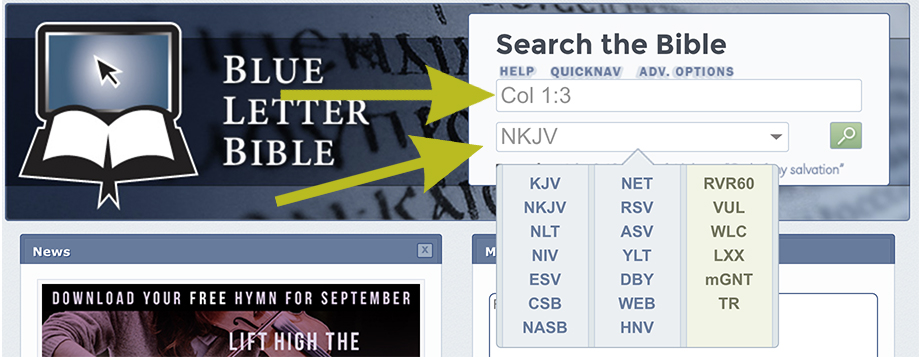
3. Hover over “tools” and select “Bibles”
The Bibles tab is great as it allows you to read your passage in a variety of translations. This can be a good way to see how different translations translate the verse (see Philippians 2:5 example above) and see potential words that may have nuances in the original language (though reading
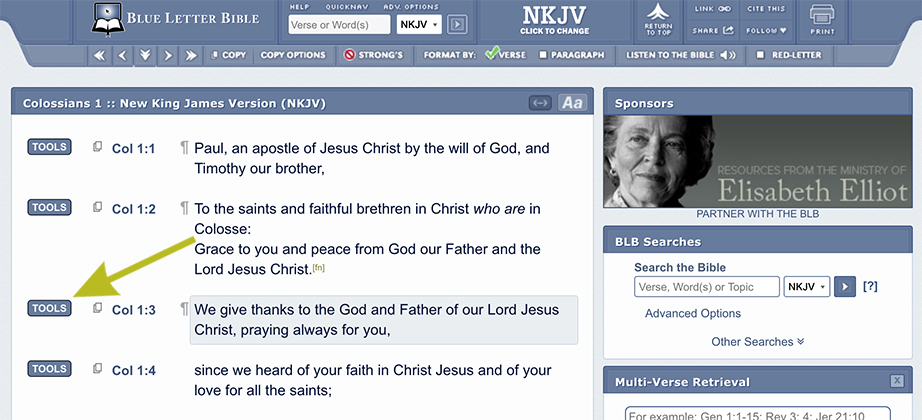
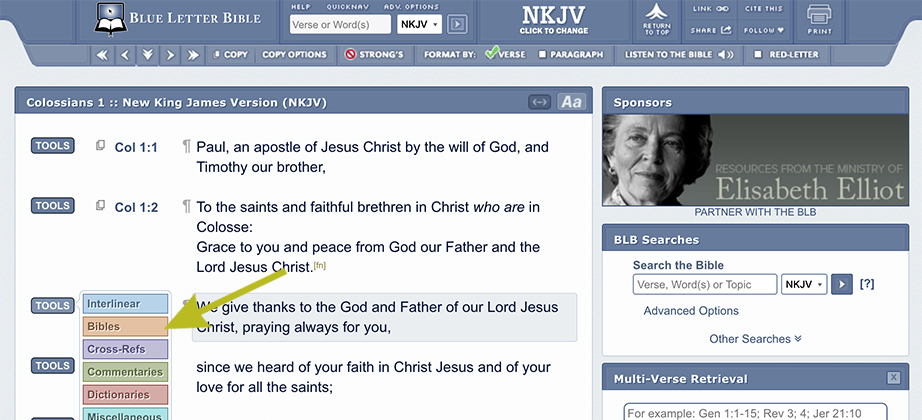
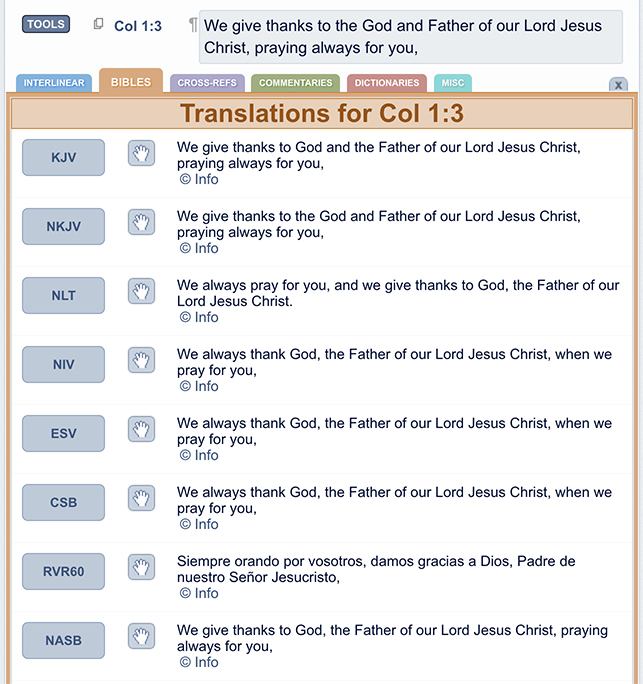
4. Click the “Interlinear” tab
The default is “reverse interlinear”—which shows the English order in either the KJV or NASB with the Greek word to the right.
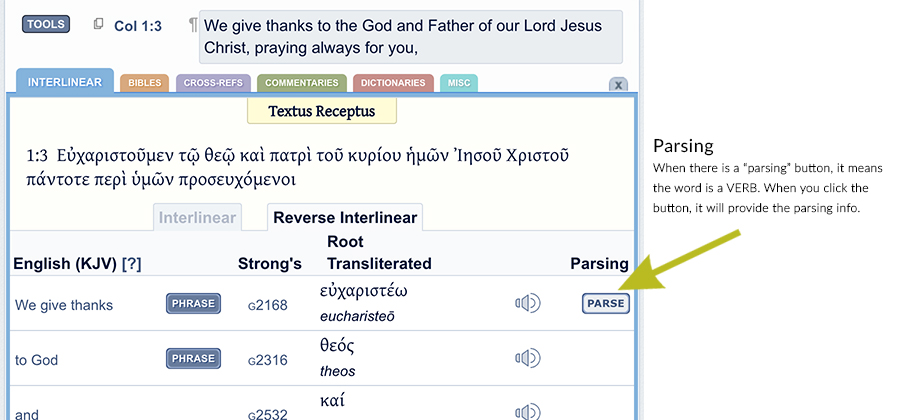
5. Click the “Strongs Number” for our word “thanks”
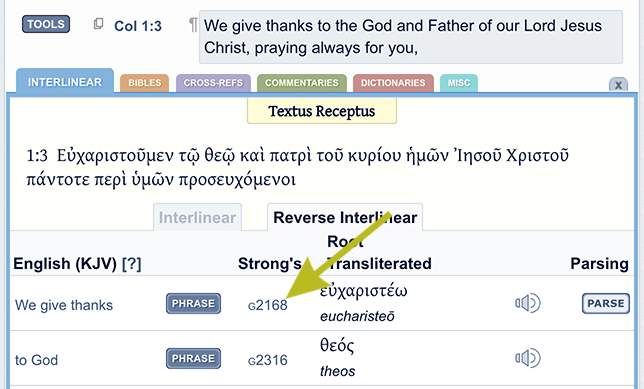
This opens up a lexicon (Greek dictionary) view of our word.
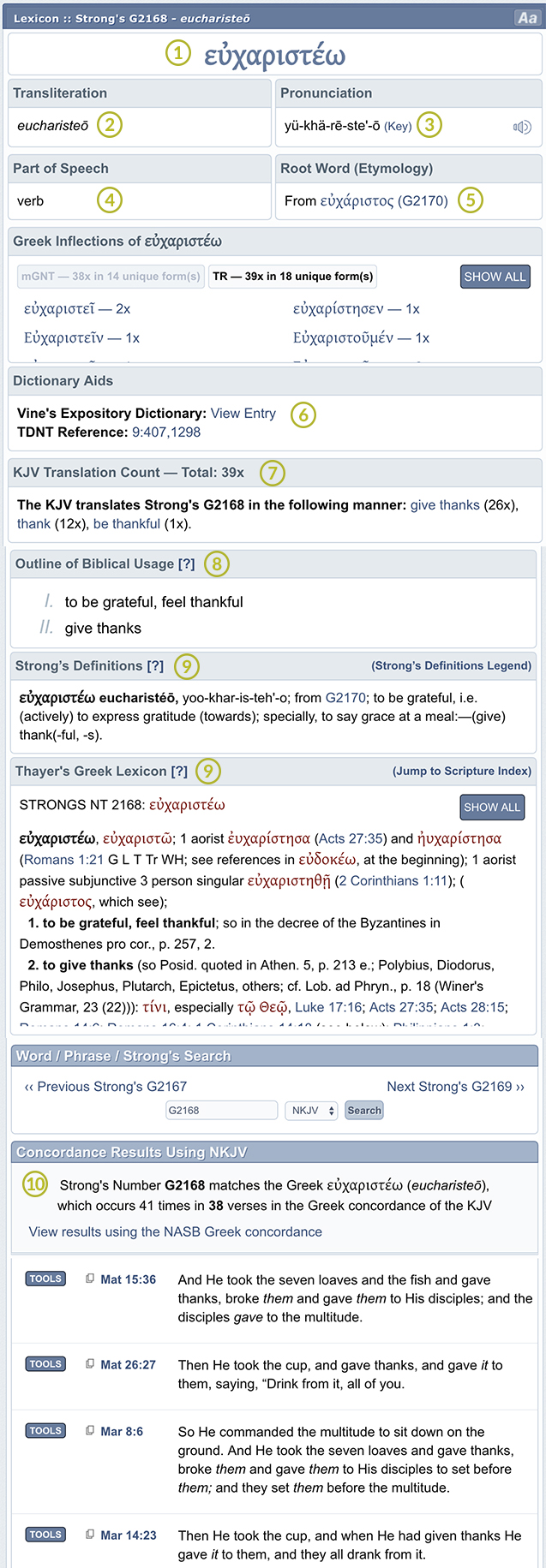
On this screen you can …
- see the Greek (or Hebrew) spelling
- εὐχαριστέω
- see the transliteration (how we spell that word using English letters)
- eucharisteō
- see a pronunciation guide and hear the word pronounced
- yü-khä-rē-ste’-ō
- see what part of speech the word is
- verb
- see the root word(s) – (if you hover over the word it will show you an English definition … clicking on the word will open that root word in lexicon view. Note: there are sometimes several root words)
- εὐχάριστος (thankful)
- read Vine’s Dictionary
- see the KJV (or NASB) Translation Count (this shows how many times this Greek word shows up in the New Testament. Below the number, it shows how that Greek word is translated in either KJV or NASB)
- Total: 39x
- give thanks (26x), thank (12x), be thankful (1x)
- see the “outline of Biblical usage” – this is the basic definition(s) and how the word is generally used throughout Scripture. (Note: because there is more than one definition (like a dictionary), it doesn’t necessarily mean that word contains all those meanings but that those are the typical meanings of the word (based on context)
- to be grateful, feel thankful
- give thanks
- for more help on the definition, you can read Strong’s Definition and Thayer’s Greek Lexicon
- see where that Greek word shows up in the New Testament in your preferred translation (ie: concordance) – this takes the Greek word and shows every verse it appears in (note: if there are a lot of occurrences, you may have to click to see more verses at the bottom of the list)
6. Think through your findings
Now that you have a bunch of information, what do you do with it?
- As with all study, the first step is to pray and ask The Author (God) for wisdom and insight.
- Read through the concordance (list of verses where that word is found). If it has less than 30 occurrences, I will often read them all. If there are a lot, I will try to read the occurrences that a particular author uses (ie: if I am studying a book by Paul, how does Paul use that word—specifically in the book I am studying, then in his other books?). The goal is to see the word in a basic context of the verses—is there any insight you gain from how this word is used.
- For example in our word “thanks,” the word used in the context of the Last Supper (Matthew26:27, Mark 14:23, Luke 22:17, 22:19, 1 Corinthians 11:24). This should make sense since we call the Last Supper the “Eucharist” (coming from our word “thanks”—eucharisteō).
- Sometimes you may notice that your word is often associated with another word in several passages. Other times you’ll pick up nuances or find that the word is used in two dramatically different ways. When you notice such things, take note and try to study and think through why it is happening.
- Summarize your findings / research / word study
- I often like to talk it through out loud as if I am trying to explain the word to another person—how can I make this word simple for someone else to understand?
- Go back to the passage and freshly think through the word and all you’ve studied in light of the context of the passage.
7. Draw a conclusion
Colossians 1:3 says that Paul and Timothy thank God and pray for the believers in Colosse (note that greater context and clarification is given in verses 4-8).
Simply, Paul and Timothy are expressing appreciation and gratitude to God for all He has done in the lives of the believers in Colosse. It is not so much because of something the Colossians did, rather, the thanksgiving is in what God has done in and through them.
Just as there is tremendous thanksgiving and rejoicing for what Jesus did upon the cross (and which we celebrate in taking communion / Eucharist) so too the hearts of Paul and Timothy are full of thanksgiving, gratitude, and praise for the work God is doing in the lives of the saints in Colosse.
Disclosure of Material Connection: Some of the links in the post above are “affiliate links.” This means if you click on the link and purchase the item, deeperChristian will receive an affiliate commission (with no additional cost to you). It is a great way to support the work and ministry of deeperChristian. Regardless, we only recommend products or services we use personally and believe will add value to our readers. We are disclosing this in accordance with the Federal Trade Commission’s 16 CFR, Part 255: “Guides Concerning the Use of Endorsements and Testimonials in Advertising.”












